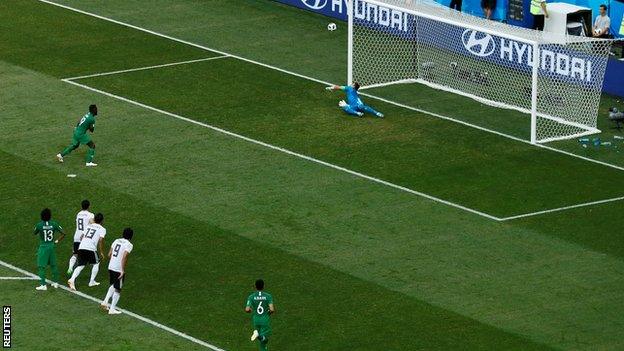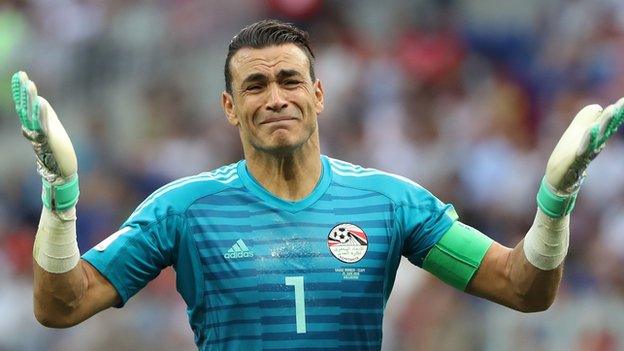World Cup 2018: Mohamed Salah scores but Egypt lose to Saudi Arabia
- Published
- comments
Highlights: Saudi Arabia 2-1 Egypt
Mohamed Salah scored his second goal of the World Cup but Egypt ended their campaign pointless with defeat by Saudi Arabia at Volgograd Arena.
The Liverpool forward gave Egypt the lead with a brilliant lob over keeper Yasser Al-Mosailem in the 22nd minute.
Egypt's Essam El Hadary, 45, became the oldest player to feature at a World Cup and saved Fahad Al Muwallad's penalty.
However, he could not stop Salman Al Faraj's spot-kick and was beaten again by Salem Al Dawsari with seconds left.
El Hadary makes history, saves pen... but ends up on losing side
It was an opening half of record achievements and firsts.
Egypt keeper El Hadary became the oldest player to feature in a World Cup match and the team scored their first World Cup goal from open play since 1934, while the Saudis scored their first of the tournament.
However, the focus was on El Hadary, who at 45 years and 161 days beat the record of Colombia keeper Faryd Mondragon (43 and three days at Brazil 2014) to become the oldest player to take to the field. He began his international career in 1996.

Egypt keeper Essam El Hadary made a fantastic save to deny Fahad Al Muwallad
He had little to do in the first half until the 41st minute when Saudi Arabia, who were 1-0 down, were awarded a penalty for Ahmed Fathy's handball.
Al Muwallad took the spot-kick, but his firm strike was brilliantly pushed onto the bar by the veteran.
However, the euphoria was extinguished in first-half stoppage time when Saudi Arabia were awarded a second penalty after a VAR review confirmed Ali Gabr pulled down Al Muwallad in the area.
Al Faraj took over the spot-kick duties and fired his effort to the right of El Hadary in the sixth minute of first-half stoppage time.
The 45-year-old remained vigilant throughout and made exceptional stops from Hussain Al-Mogahwi and Mohannad Aseri headers.
However, just when it seemed like his heroics had earned his side their first point of the tournament, Al Dawsari fired in an angled shot for Saudi Arabia's first World Cup win since 1994.
How did Salah perform?
Salah opens scoring for Egypt with smart finish
It was a tale of two halves for the Liverpool player.
In the first period, he looked dangerous and worked well in tandem with right-sided midfielder Trezeguet.
His goal was 'classic Salah' - collecting a long, raking pass with one touch before lifting the ball over the advancing Saudi Arabia goalkeeper.
The 26-year-old should have doubled his tally when he found himself one-on-one with Al-Mosailem, but instead inexplicably dinked his finish wide of the left-hand post.
Salah was less effective in attack after the break, and was forced to defend as Egypt came under pressure from their opponents.
A pre-tournament injury and controversy over his meeting with the Chechnya leader meant it was not the ideal build-up to his first World Cup, nor the finish he would have wanted. But having scored two goals, Salah leaves his mark on football's biggest stage.
Man of the match - Essam El Hadary (Egypt)

A fantastic penalty save and two good reaction saves from second-half headers - he might have ended up on the losing side but both he and his country will remember his World Cup debut for years to come
Saudi Arabia coach Juan Antonio Pizzi: "Up until the Salah goal we didn't leave any gaps or make mistakes.
"After those efforts we kept possession during the first and second half. They only had two chances. We kept them in check.
"Today we kept control of the pace and possession. This was a deserved win.
"Regarding my future, the association will have to decide what to do."
Al Faraj also makes history - the stats
Saudi Arabia ended a run of 12 World Cup matches without winning (D2 L10), recording their first victory since June 1994 when they won 1-0 against Belgium.
This was Egypt's seventh match at the World Cup without winning (D2 L5) - only Honduras have played more times at the World Cup without recording a win (9).
El Hadary became the second goalkeeper at the 2018 World Cup to save a penalty on his tournament debut after Iceland's Hannes Thor Halldorsson, who did so against Argentina.
This match was the first time Egypt have ever led in a World Cup match, in what was their seventh match in the competition.
Al Faraj's penalty goal for Saudi Arabia, scored after 50 minutes and 36 seconds, was the latest goal scored in the first half of a World Cup game since 1966.